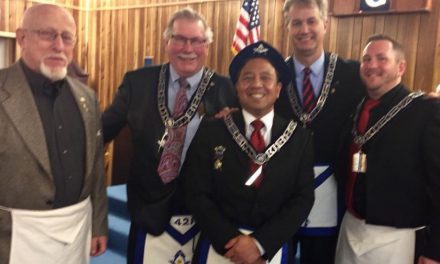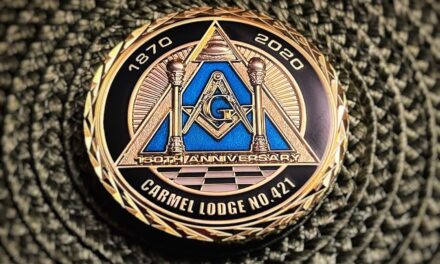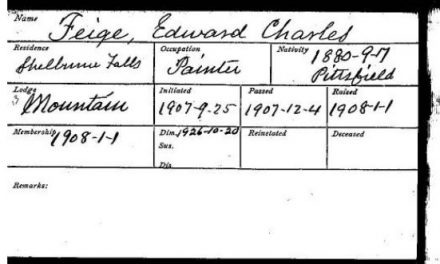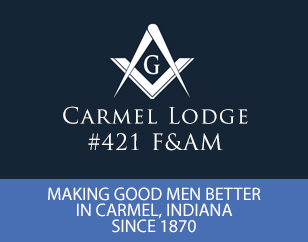A Quick Video Overview of Freemasonry
Below: “Freemasonry Today”
Another (older but timeless!) Video
Below: “Freemasonry and the Fabric of America”
What is Freemasonry? (from IndianaFreemasons.com)
Freemasonry is the world’s oldest, largest, and best-known gentleman’s fraternity. Founded in London, England in 1717, its current worldwide membership totals 3.5 million members, 1.3 million of which are in the United States. As a fraternal organization, Freemasonry unites men of good character of different religious, ethnic, and social backgrounds, who share a belief in the fatherhood of God and the brotherhood of mankind.
Freemasonry (often simplified to “Masonry”) is based on the medieval stonemason guilds who built the great castles and cathedrals of Europe. The traditions of the fraternity are founded upon the building of King Solomon’s Temple in Jerusalem, and modern Freemasons likewise use the tools, traditions and terminology of those earlier stonemasons as allegories for building temples in the hearts of men. Its body of knowledge and system of ethics is based on the belief that each man has a responsibility to improve himself, while being devoted to his family, faith, country, and fraternity.
Fellowship
By attending Masonic Lodge meetings and learning from your fellow Masons, you’ll strengthen the bonds of fellowship as you join together with like-minded men who share ideals of both a moral and metaphysical nature. There are Masonic lodges on every continent on Earth, and in almost every nation. You’ll enjoy the friendship of other Masons in the community, and you’ll be welcomed as a “Brother” by Masons everywhere in the world. Freemasonry also promises that should you ever be overtaken by misfortune, sickness, or adversity through no fault of your own, the hands of our great fraternity will be stretched forth to aid and assist you.
Charity
While Freemasonry itself is not a charity, from its earliest days, charity has been the most visible Masonic activity. Freemasons have always been devoted to caring for disadvantaged children, the sick and the elderly. In fact, Masons in North America give away approximately $2 million to national and local charities each day, of which more than 70% is directed toward the general public. Masons are also actively involved in a great deal of community volunteer work. But personal acts of charity are deemed to be an essential cornerstone of Masonic philosophy, and this begins with agreeing to help, aid and assist fellow Freemasons and their families.
Education
The Grand Lodge of Indiana has advocated the education of its members since its beginning in 1818. Its ceremonies provide instruction to all members, supplemented by various other activities such as seminars, lectures, workshops, and reading. Because Freemasonry is an esoteric society, certain aspects of its work are not generally disclosed to the public. Freemasonry uses an initiatory system of degrees to explore ethical and philosophical issues, and the system is less effective if the observer knows beforehand what will happen. It is described in Masonic craft ritual as “a beautiful system of morality veiled in allegory and illustrated by symbols.”
Much has been rumored of Masonic “secrecy” for over three hundred years. Like so much that comprises our ceremonies and ritual, secrecy is used as a symbolic lesson to reinforce our philosophy of honor. Thus, the reputation of each Freemason, and of the fraternity as a whole, is reinforced. Since its very beginnings, Freemasons have been regarded as the most admirable men in their communities.
Leadership
Freemasonry offers its members leadership opportunities at the lodge, District, and Grand Lodge level. As Freemasons progress through the Craft, they discover different aspects of themselves and develop a range of skills that even they might not have known they possessed. By developing leadership techniques that fit their personality, Masons unlock the door to their full potential.
More About Freemasonry (from IndianaFreemasons.com)
(A Masonic) lodge will perform three degrees (initiation ceremonies) for your education and enjoyment. These ceremonies are very dignified and inspirational. At no time will horseplay or indignities enter into the program. These degrees are very solemn and Masons take the task of making Masons very seriously. After becoming a Master Mason (the third degree of the lodge) you may seek membership in the many other Masonic related groups these are often referred to as appendant bodies.
This process of going through the degrees can be done traditionally in your own lodge with smaller groups that include other candidates entering your lodge just like you. This process would start with the Entered Apprentice degree and then move to the Fellow Craft degree and conclude with the Master Mason degree. This traditional process could take 3-6 months based on the system of the lodge you choose. This process is very rewarding and will help you get to know the brothers at your lodge.
There are many more degrees you can take and several different groups you may choose to get involved with as you grow in the fraternity. These are only available to you after becoming a Master Mason.
For more information about Masonry, contact Carmel Masonic Lodge #421 and schedule a talk with a lodge member Mason. There is no pressure to join and you will most certainly come away with a better understanding of why Masonry is so important to the members of Carmel 421. As the lodge is only open for activities a few times a week, it is best to contact us via our email form, or call and leave a message at (317) 846-2346. Just let us know you have an interest in Masonry and wish to talk with a Carmel Lodge member.
Q & A’s About Freemasonry…
If there is one thing most people are sure they know, it’s that Masons are never supposed to talk about Masonry.
Not true. Oh, there are some secrets – but there’s nothing in them that would interest anyone except a Mason. Almost all of the “secrets” deal with ways of recognizing each other. But as far as Freemasonry, what it does, what it teaches, how it’s organized, where it came from, what goes on in a Lodge meeting – that’s open for discussion. Given a chance, we’ll probably tell you more than you really wanted to know. We’re excited about the Fraternity, we get a lot out of it, and we really want to share that with others.
Then why hasn’t anyone ever asked me to join? People have asked me to join Rotary, Lions, and other clubs.
It’s no reflection on you. There is a rule in Masonry that a person must seek admission himself. We aren’t allowed to go out and twist arms. There is a reason for that. A person needs to come to Masonry because he really wants to, not because he’s been talked into it. Masonry is a real commitment. If you are a Mason and you need help, every Mason in the world MUST help you, if he possibly can. By the same token, you must be willing to help any Mason who needs it. And then there is another reason – a person has to be ready for Masonry. Masonry isn’t a civic club, although we do a lot of civic projects. It is a Fraternity. We’re dedicated to the growth and development of our members as human beings. A person has to be ready to grow, has to suspect that there is something more to life, and wants to know what that is, before he is really ready to become a Mason.
What goes on in a Masonic Meeting?
There are two types of meeting agenda. The first is like the business meeting of any other organization. It takes us just a bit longer to call the meeting to order, because we use a longer opening ceremony or ritual than most civic clubs do. But, it reminds us of some of the most important lessons in Masonry. Then, when the lodge is “open”, we hear the reading of the minutes, vote to pay bills, take care of old and new business, and plan projects, just like everyone else. The other type of meeting is one in which new members are received. This is done with a beautiful ritual, centuries old, which is designed to teach some important lessons and to start the person thinking about his own nature as a spiritual being.
What’s the initiation like?
The Ceremonies of Masonic Initiation are meaningful and historic. Nothing humorous or embarrassing is permitted. In fact, it is a very serious Masonic offense to allow anything to happen during an initiation which is undignified or “funny”.
I’ve heard that Masonry is a religion. Is it? Can a man be a Mason and a Christian at the same time?
Masonry acknowledges the existence of God. No atheist can become a Mason. Prayer is an important part of the Masonic ritual. Masonic vows are taken in the name of God, but Masonry never tries to tell a person how he should think about God, or how he should worship God, or why he should believe. We offer no plan of salvation. We teach that man should live a good life, not because that alone will earn him entrance into heaven, but because anything else is destructive, both to himself and to those around him. It is good to be good. As to whether a man can be a Mason and a Christian, the best answer is that most us are. There are many Free Masons who belong to other faiths, including Judaism, Islam, Hinduism and Buddhism, but the majority in America are Christian. And we number many, many ministers of many different denominations. As Dr. Norman Vincent Peale, an active Freemason himself, once remarked: “Masonry encourages men to be good and that can never conflict with Christianity”.
Are there any churches or religions whose members you won’t accept as Masons?
No. A man’s belief is his own business, and Masonry has no right to approve or disapprove of his belief.
What about those “Secret Vows” I hear so much about?
The exact words of the vows are secret. That’s one of the ways we recognize each other. The contents of the vows are not. In less formal language than we use in the Ritual, a Mason promises: “to treat women with deference and respect, to help a Brother when he asks for and needs help, to remember that people are entitled to dignity and respect and not to treat them as if they were things, to follow the directions of the Grand Lodge in things Masonic, and if he disagrees, to use the proper channels to express that disagreement and seek resolution, to respect the traditions of the Fraternity, and to keep secret the few things that are secret”.
Why don’t you let women join?
We’re a Fraternity, a Brotherhood. The essence of a fraternity is that it is for men, just as the essence of a sorority is that it is for women. That’s the primary reason. Recent developments in psychology and sociology have discovered another reason. There is a new thing called “male bonding.” That’s the new technical way of saying something that has been known for thousands of years. It’s important for men to have a few things they do by themselves, just as it is for women to have the same thing. But that doesn’t mean that there is no place for women in Masonry. In fact, there are several Masonic organizations for both women and men. The order of the Eastern Star, with one of the most beautiful rituals anywhere, is one. So are the White Shrine of Jerusalem, the Order of Amaranth, the Social Order of Beauseant, and several others.
Just what is a “Lodge?” What does it look like? Who runs it?
A lodge is both a meeting place for Masons and the Masons who meet there. You could actually say “The Lodge is a meeting at the Lodge.” It’s a Middle English word. When the great cathedrals of the Middle Ages were being built, the masons had special, temporary buildings built against the side of the cathedral in which they met, received their pay, planned the work on the cathedral and socialized after work. This building was called a lodge. The term has simply remained down through the ages. As to the officers, the leader of the Lodge, the President is the “Worshipful Master”. That title doesn’t mean we worship him, although some people have thought that is what it means. The titles we use come from Middle English, about the time of Chaucer. Just as mayors in England and Canada are addressed as “Your Worship”, the Master of the Lodge is called “Worshipful Master”, meaning “Greatly Respected.” The First Vice President is the Senior Warden. The second Vice President is the Junior Warden. We have a Secretary and a Treasurer, just like any other organization. Assisting the Master are the Senior and Junior Deacons. They carry messages and help with the ritual work. The Senior and Junior Stewards help guide the new candidates in the initiation and also traditionally set out refreshments. Finally, the Tiler sits at the door to make sure that the Lodge is not interrupted and to help visitors get into the Lodge Room.
If that is the Lodge, what is the “Grand Lodge?”
The Grand Lodge is the State Organization of Masons. The local Lodges are members of the Grand Lodge. The Grand Master is the same as the State President.
Just what do Masons do?
Charity is the most visible Masonic activity. Each year Masons give many millions of dollars to charity. Some are large projects, some are small. Among the hundreds of local projects, we sponsor large programs such as Children in Crisis, and Blindness Prevention programs, testing thousands of school children and senior citizens for vision problems. We have strong commitments to public education. Many Lodges have programs in which they recognize outstanding students. We have essay contests, awards for outstanding teachers and even programs to help teachers get supplies. The Fraternity gives hundreds of college scholarships to students each year. Nationally, throughout the United States, the Masons give an average of $1,500.000.00 (that is one and a half million) EVERY DAY to charitable causes, most of which are not Masonic. A fact never publicized and thus hardly known. All those things are external, and they are important. But the real things the Masons do are far more difficult to describe. In essence, we try to build ourselves into better men, better fathers, better husbands and better citizens. We strive for self development and self improvement. We try to learn more about what it means to be human and what it takes to become better men.
How does a man become a Mason?
As we said earlier, no one will ever twist your arm to become a Mason. If you decide you want more information, we’ll be happy to provide it through the Grand Lodge in your jurisdiction. If you want to join our Fraternity it works this way: “Ask any Mason for a petition (to join). Fill it out and return it to him. He’ll take it to his Lodge and turn it in. A committee (of about three) will be appointed to talk with you and with people you may list. Its purpose is to ascertain that you are a man of good character and that you believe in God. Atheism and Freemasonry are not compatible. The committee will report its recommendation back to the Lodge. The Lodge will vote. If your petition is accepted, the Secretary will contact you about a date for the first of three degrees. There is some study and a bit of memory work required with which your Lodge Brothers will always help you. After the Third Degree you will be a full-fledged Master Mason and will have joined the oldest global brotherhood in the world!
If you’d like to learn more about Carmel Lodge #421 or talk to a Mason from our lodge, contact us anytime.
While you’re at our website, check out the latest news and events at our lodge.
Carmel 421 is often considered a young lodge (by average age of active members) however the lodge was chartered May 24, 1870.
Stated Meetings start at 7:00 pm, 2nd Thursday of every month with dinner at 06:30 pm. All visiting brothers and interested men over 18 are invited to attend.
Pancake breakfast 2nd Saturday of every month, 07:30am-10:30am – The public is invited (you do not have to be a Mason to attend and this is a great place to meet Masons if you have an interest or questions).
If you have an interest in Masonry or membership, check out our Masonic Resources here.






